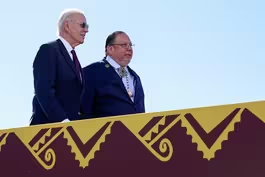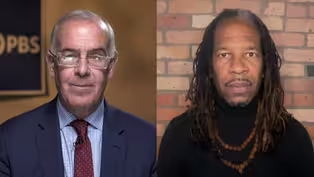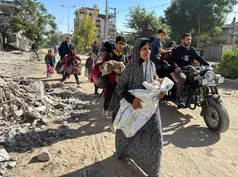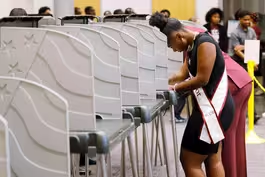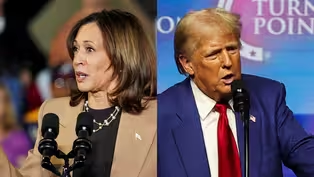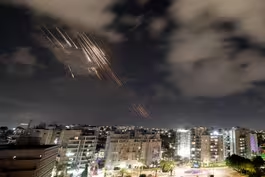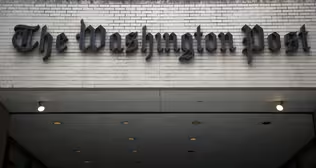
The creator of LGBTQ History Month on sparking a movement
Clip: 10/25/2024 | 3m 27sVideo has Closed Captions
The teacher who created LGBTQ History Month reflects on how he sparked a movement
St. Louis teacher Rodney Wilson founded LGBTQ History Month 30 years ago. He recently spoke to communities correspondent Gabrielle Hays about coming out to his students in 1994 and his hope for a more understanding society.
Problems playing video? | Closed Captioning Feedback
Problems playing video? | Closed Captioning Feedback
Major corporate funding for the PBS News Hour is provided by BDO, BNSF, Consumer Cellular, American Cruise Lines, and Raymond James. Funding for the PBS NewsHour Weekend is provided by...

The creator of LGBTQ History Month on sparking a movement
Clip: 10/25/2024 | 3m 27sVideo has Closed Captions
St. Louis teacher Rodney Wilson founded LGBTQ History Month 30 years ago. He recently spoke to communities correspondent Gabrielle Hays about coming out to his students in 1994 and his hope for a more understanding society.
Problems playing video? | Closed Captioning Feedback
How to Watch PBS News Hour
PBS News Hour is available to stream on pbs.org and the free PBS App, available on iPhone, Apple TV, Android TV, Android smartphones, Amazon Fire TV, Amazon Fire Tablet, Roku, Samsung Smart TV, and Vizio.
Providing Support for PBS.org
Learn Moreabout PBS online sponsorshipAMNA NAWAZ: St. Louis teacher Rodney Wilson founded LGBTQ History Month 30 years ago and celebrated in this country in the month of October.
Wilson recently spoke to our communities correspondent, Gabrielle Hays, about coming out to his students in 1994 and his hope for a more understanding society.
RODNEY WILSON, Founder, LGBTQ History Month: Well, there was so much going on outside of my classroom.
My textbook for, example, didn't have anything about LGBTQ people or LGBTQ history.
And at this point, I was completely out to, everyone except on the job, except to colleagues, except to my students.
So, in March of 1994 during a lesson the Holocaust, I simply mentioned -- there was a pink triangle.
I mentioned that could have been for me potentially.
As a gay person, I might have fallen underneath that umbrella of persecution.
So that was the way in which I came out to my students at Mehlville High School in South County, St. Louis.
So I had trepidation, but I also had anticipation that this was the right thing to do, this was a good thing to do, this would be beneficial to my students and be beneficial to my school and be beneficial to myself, because there would no longer be a place where, when I show up, I have to go in a closet, I have to pretend to be something I'm not, or at least not comment on certain areas of life.
GABRIELLE HAYS: Sure.
RODNEY WILSON: Because you don't want to give away the secret.
So I found it overwhelmingly liberating.
Well, my idea always from the beginning was that this would be an organic month, that it didn't have to have a lot of top-down leadership.
We did have a national coordinating committee that first couple of years, and we created packets of information.
But the idea was always, I want this to exist the same way Black History Month in February exists, Women's History Month in March exists.
It's just something in the atmosphere.
And in secondary schools, on college campuses, at universities, in community institutions, people will remember, October's coming up, we have a certain occasion in October, let's do something.
So I was hope -- I was hoping that it would grow organically on its own, which is what happened.
If you look today, if you Google LGBTQ History Month 2024, you will find lots of colleges and universities and community groups doing a lot of things.
Everyone is part of the historical narrative.
We're all in this story.
And, right now, we're all on this planet together.
We're contemporaries.
And we need to be doing everything we can to make the world, to make our country, to make our communities, neighborhoods friendlier, warmer, more welcoming, more understanding.
If you don't understand something, no problem.
Learn about it.
Don't just stay in your not understanding something.
Move forward until you do understand it.
So that would be my message, that we are a human family and we're trying to learn to love each other and understand each other and take care of each other.
Biden issues apology for Indigenous boarding schools
Video has Closed Captions
Clip: 10/25/2024 | 6m 55s | Biden issues 'long overdue' apology for federal Indigenous boarding schools (6m 55s)
Brooks and Granderson on the presidential race deadlock
Video has Closed Captions
Clip: 10/25/2024 | 10m 6s | Brooks and Granderson on why the presidential race is deadlocked in the polls (10m 6s)
Gaza crisis worsens as hospitals are overwhelmed amid war
Video has Closed Captions
Clip: 10/25/2024 | 6m 12s | Gaza faces medical crisis as remaining hospitals are overwhelmed amid war (6m 12s)
Gen Z voters could be deciding factor in who wins N.C.
Video has Closed Captions
Clip: 10/25/2024 | 8m 36s | North Carolina's Gen Z voters could be deciding factor in who wins the state (8m 36s)
Harris, Trump detour from swing states to campaign in Texas
Video has Closed Captions
Clip: 10/25/2024 | 4m 48s | Harris and Trump take a detour from swing states to campaign in Texas (4m 48s)
Israel launches retaliatory strikes on targets in Iran
Video has Closed Captions
Clip: 10/25/2024 | 2m 24s | Israel launches retaliatory strikes on military targets in Iran (2m 24s)
Why The Washington Post decided to opt out of an endorsement
Video has Closed Captions
Clip: 10/25/2024 | 5m 56s | Why The Washington Post decided to opt out of a presidential endorsement (5m 56s)
Providing Support for PBS.org
Learn Moreabout PBS online sponsorship
- News and Public Affairs

FRONTLINE is investigative journalism that questions, explains and changes our world.

- News and Public Affairs

Amanpour and Company features conversations with leaders and decision makers.
Urban Consulate Presents











Support for PBS provided by:
Major corporate funding for the PBS News Hour is provided by BDO, BNSF, Consumer Cellular, American Cruise Lines, and Raymond James. Funding for the PBS NewsHour Weekend is provided by...
